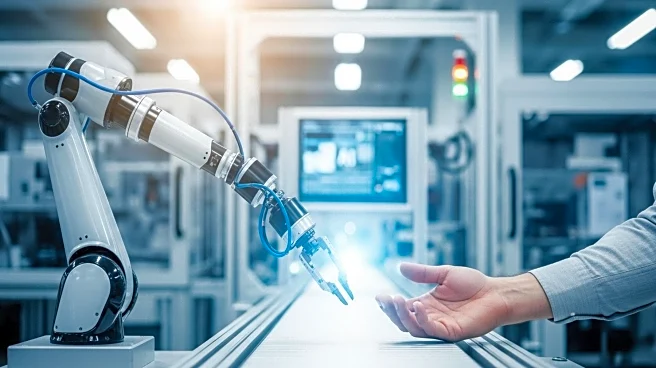What is the story about?
What's Happening?
Walmart CEO Doug McMillon has issued a warning that artificial intelligence will 'change literally every job' as the company plans to automate more roles while maintaining a stable workforce size over the next few years. During a conference at Walmart's headquarters, McMillon emphasized that AI will eliminate some jobs and tasks while creating new ones. Walmart is actively tracking job trends to prepare workers for AI's impact, aiming to provide opportunities for employees to adapt. The company has already implemented AI in its supply chain and customer service, and is exploring further automation in warehouses and back-of-store tasks.
Why It's Important?
Walmart's approach to AI integration reflects a broader trend in the retail industry, where automation is increasingly used to enhance efficiency and reduce costs. As the largest private employer in the U.S., Walmart's actions could influence other companies' strategies regarding AI adoption and workforce management. The potential for job displacement and the need for reskilling are critical issues that Walmart and similar companies must address. The gradual implementation of AI-related changes may offer insights into balancing technological advancements with workforce stability.
What's Next?
Walmart plans to continue integrating AI into various aspects of its operations, including customer service and supply chain management. The company is also hiring for new roles, such as 'agent builders,' to develop AI tools. As AI becomes more prevalent, Walmart will need to ensure effective training and support for employees transitioning to new roles. The retail industry may see increased collaboration between companies and educational institutions to facilitate workforce adaptation to AI technologies.
Beyond the Headlines
The ethical implications of AI-driven workforce changes at Walmart could spark discussions on the role of technology in shaping employment landscapes. The company's commitment to maintaining a stable workforce size while embracing AI may serve as a model for other businesses navigating similar challenges. Long-term shifts in job structures and the potential for increased reliance on AI in decision-making processes may influence corporate strategies and societal attitudes toward automation.
















